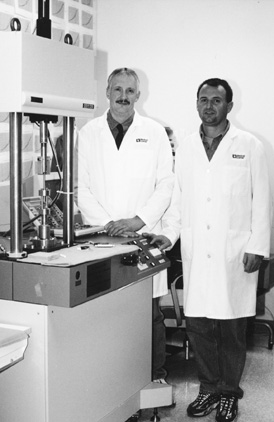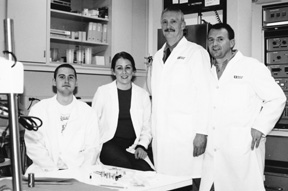 |
Mark Beatty, D.D.S., left, and lab technician Bobby Simetech with a new servohydraulic strength testing machine purchased for the UNMC College of Dentistry. Photos by Jana Miller. |
“The new areas allowed us to expand our program and collaborate with other universities and scientists,” said Mark Beatty, D.D.S., associate professor and director of the section of biomaterials in the UNMC College of Dentistry department of adult restorative dentistry.
The expanded facilities also have made it possible to increase the level of research conducted by graduate students, he said. “Without the remodeled work area and a full-time lab technician, both made possible by the college’s Research Initiative, the researchers would be well behind where we are now,” Dr. Beatty said.
Because of the enhanced facilities, the college was able to successfully compete for University of Nebraska Foundation funds allocated to UNMC. The College of Dentistry received $88,000 to purchase a servohydraulic machine used for fatigue testing on dental materials.
“It is used to test synthetic materials and the durability of tissues, such as TMJ (tempro-mandibular joint) cartilage,” Dr. Beatty said. “It is absolutely critical equipment for one of our newer areas of research, tissue engineering, or the regeneration of tissue lost to disease or trauma.” It also is used to test the long-term environmental and loading effects on dental materials.
 |
Dr. Mark Beatty, second from right, meets with UNL biological systems engineering students Adam Shaver of Scottsbluff, left, and Krista Evans of Bellevue. The engineering students assisted with research in the biomaterials lab at the College of Dentistry. On the far right is lab technician Bobby Simetech. |
In fact, the researchers published their first paper on their work in the December 2002 issue of the national journal, “Tissue Engineering.” Dr. Beatty, Jeffrey Nickel, D.M.D., Ph.D., Laura Iwasaki, D.D.S., Ph.D., and Ajay Ojha, D.D.S., a prosthodontic resident, authored the article. Collaborators included the UNMC department of orthopedics and the University of Missouri College of Veterinary Medicine.
The researchers also have received a UNMC grant to study the effects of applied force on tissue-engineered cartilage.
In a separate project, College of Dentistry researchers are collaborating with the University of Missouri and Creighton University to study a series of fibrocartilaginous tissues, looking at the mechanism that underlies cartilage degradation and ultimately osteoarthritis. Through testing at the College of Dentistry, researchers are trying to understand the mechanical factors and the cellular responses responsible for the progression of osteoarthritis.
Researchers plan to submit a collaborative grant to the National Institutes of Health for an in-depth study to better understand the progression of osteoarthritis. “If that research is successful we ultimately hope to engineer replacement tissue for damaged cartilage,” Dr. Beatty said.
In addition to the enhanced laboratory facilities in the Cruzan Center for Dental Research, the biomaterials researchers are benefiting from the addition of full-time lab technician Bobby Simetich, who maintains equipment and assists faculty and students with research.
“He is a very key part of this,” Dr. Beatty said. “He has accrued very critical preliminary data necessary for writing successful grant proposals. He works with those of us who write and submit grants. He’s integral to that.”
In another area of research, Dr. Beatty continues to study facial prosthetic materials for patients with head and neck cancer and other conditions or injuries. Originally, his work was directed at trying to identify weaknesses that caused the prosthetic materials to fade, peel and lose flexibility. Now, he has a grant to study novel pigment systems, previously unexplored in dentistry. He is working with J.M. Huber of Macon, Ga., an industrial pigment manufacturer, and Crompton Corp. of Terrytown, N.Y., a supplier of the polymer component used in the prostheses.
The need to extend the lifetime of custom-made prosthetic eyes, ears and noses is great, Dr. Beatty said, noting the rapid expansion of Dr. Gordon Mahanna’s clinic in Omaha. Dr. Mahanna, a prosthodontist, is seeing increasing numbers of patients who need prosthetic facial appliances. Those patients come not only from Nebraska, but across the Midwest. “The clinic has tripled in size. They are seeing astonishing numbers,” Dr. Beatty said.
Head and neck cancer patients, as well as people who have suffered trauma or who were born with genetic defects, are among Dr. Mahanna’s patients. Facial prosthetic materials are one of the most under-researched dental issues today, Dr. Beatty said.
“I think even if we double the life of the materials from one to two years, we have substantially advanced the field and improved the quality of life for these people,” he said. “We are closer. We understand better where weaknesses in materials lie and what we need to address to improve their longevity.
To support his work, Dr. Beatty was awarded a $165,000 grant from the U.S. Department of Veterans Affairs. The grant will provide some salary support for Dr. Beatty and Simetich. It is Dr. Beatty’s first externally funded grant from a federal agency, and it took almost a decade to get there, he said.
In the past few years, the number of people researching biomaterials has grown dramatically, Dr. Beatty said. “What we really need are more faculty positions, more endowed professorships in which a faculty salary is paid from endowed money, not state money,” he said. “We need more people — researchers, technicians and creative thinkers.”